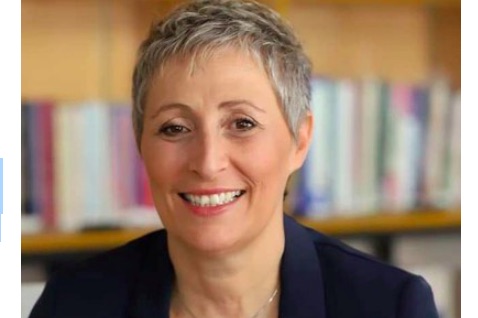TOLERANCE & SOLIDARITY .
A article by Susan Kim for the World Council of Churches
Salpy Eskidjian Weiderud, leader of the Religious Track of the Cyprus Peace Process, received an International Religious Freedom Award from the US Department of State on 17 July. She paused to speak with WCC Communication with a word about what has inspired her life’s work for peace.

Photo: Kyriakos Arkatides
Q: You are fresh from receiving the International Religious Freedom Award. How did the ceremony move you?
Weiderud: It was extremely overwhelming and it’s a huge honor. I’m humbled. It’s important because it will help shine a light on the joint efforts of the religious leaders in Cyprus to advance religious freedom, and also inspire others working on issues of religious freedom around the world.
Q: Have you always been passionate about being a peacemaker?
Weiderud: Yes! I myself grew up with stories of my ancestors being persecuted, deported and massacred. My family came as refugees from Turkey to Cyprus. My grandmother was five at the time, and my great-grandparents brought her and her siblings to Cyprus. I grew up hearing their stories of pain, fear and violence. Yet at the same time my family did not choose hatred. There was so much pain; still they chose to talk about faith, hope and love. They practiced what they preached. Their stories of coexistence and friendships inspired me. I grew up on a divided island where conflict and its transformation became an existential reality. To me, there was no other option: you worked for a world that was a better place. A world that was free and safe for all, where everyone’s human rights were respected. So nothing else made sense to me.
(continued in right column)
How can different faiths work together for understanding and harmony?
Can Cyprus be reunited in peace?
(continued from left column).
Meeting amazing committed people in the ecumenical movement was another inspiration for me to be a peacemaker.
Q: In 2017, the Religious Track of the Cyprus Peace Process released a joint statement of the religious leaders of Cyprus condemning all forms of violence against women and girls. What do you think is the best way to address gender-based violence?
Weiderud: In my area, working with faith leaders, especially in Cyprus, the biggest step has been to take responsibility through joint action so that religious leaders don’t feel they are taking steps by themselves. Together, they advocate for each other’s rights and religious freedom. For the first time ever, Christian and Muslim religious leaders of Cyprus made a commitment against this violence.
Q: How has the Religious Track followed up on this statement with action?
Weiderud: We continuously facilitate the process to ensure that the statements and actions keep their unity, and that statements and actions are well-rooted and owned by the religious leaders. We have helped religious leaders make new alliances with women’s organizations in both the Greek Cypriot and Turkish Cypriot communities and take full responsibility of their own commitments. We are working to ensure safe spaces for sharing of information and developing joint action. It’s very important to ensure that everyone feels feel connected and that they are working together — victims and religious leaders. Our work takes time, it requires patience, sensitivity and service but it’s worth it because we ensure that there is unity and ownership to move statements into action. It’s been exciting for us to organize events that have been unheard of, such as the social media campaign 16 Days of Activism for the Elimination of Violence against Women and Girls.